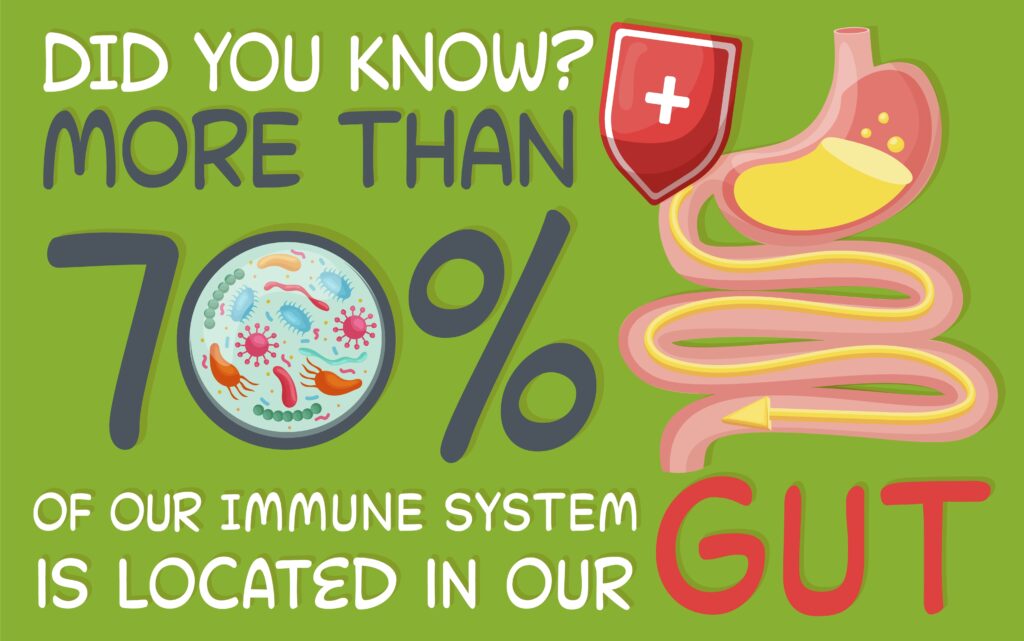When I was first diagnosed with gout, I thought it was all about food—avoiding red meat, seafood, and alcohol. But I later learned gout is also about how your body processes uric acid, and that process starts in the gut.
Your gut is home to trillions of bacteria, known as the gut microbiome. Some of these bacteria help keep you healthy, while others may increase inflammation. Recent studies show that your gut bacteria play an important role in uric acid metabolism, which means gut health and gout are more connected than most people think.
How Gut Health Affects Gout
Gout happens when there’s too much uric acid in the blood. Normally, your kidneys flush uric acid out. But when uric acid builds up, sharp crystals form in the joints, often starting with the big toe.
Certain gut bacteria may help by producing short-chain fatty acids (SCFAs), which support the intestines and help your kidneys remove uric acid. A balanced microbiome lowers inflammation and supports better uric acid control.
But if your gut is unbalanced, called dysbiosis, harmful bacteria take over. This imbalance might trigger inflammation, weaken uric acid clearance, and make gout attacks more frequent and painful.
Probiotics and Gout Relief
One way to support gut health is by adding probiotics to your gout diet. Probiotics are “good” bacteria found in foods like yogurt, kefir, sauerkraut, and miso soup.
Research suggests some probiotics, like Lactobacillus, may help break down purines before they become uric acid. Others may improve uric acid excretion. While probiotics are not a cure for gout, they can be part of a healthy, supportive plan for joint health.
For me, including probiotic foods a few times a week has made a noticeable difference. If you don’t like fermented foods, probiotic supplements may also be an option—just ask your doctor first.
Prebiotics and Fiber for Gout
It’s not only about adding good bacteria—you also need to feed them. That’s where prebiotics come in. Prebiotics are types of fiber that help good bacteria grow stronger.
Foods rich in prebiotics include:
-
Oats
-
Beans and lentils
-
Apples and bananas
-
Asparagus
-
Leafy greens
A high-fiber diet not only improves gut health but also helps manage weight. Since extra body weight is a risk factor for gout, fiber supports you in more than one way.
Gut Health, Inflammation, and Gout
Your gut doesn’t just handle digestion—it influences inflammation across your whole body. When bad bacteria dominate, toxins may leak into the bloodstream, leading to chronic inflammation.
Because gout itself is an inflammatory condition, reducing inflammation is key. Supporting gut health with probiotics, prebiotics, and fiber-rich foods can calm the body’s response and protect the joints.
Lifestyle Habits to Support Gut and Gout Health
Diet is important, but lifestyle habits matter too. Here are steps that help me manage both gut health and uric acid:
-
Drink more water: Hydration helps kidneys flush out uric acid.
-
Exercise daily: Even a 30-minute walk improves circulation and gut health.
-
Avoid alcohol and sugary drinks: Beer and soda may raise uric acid and hurt gut balance.
-
Get enough sleep: Sleep keeps the microbiome healthy and lowers inflammation.
-
Reduce stress: Stress hurts gut health and might trigger gout attacks.
Foods for a Gout-Friendly, Gut-Healthy Diet
To bring it all together, here are foods that support both your microbiome and your joints:
-
Probiotic foods: Yogurt, kefir, kimchi, sauerkraut, miso
-
Fiber-rich foods: Whole grains, beans, vegetables, fruits
-
Anti-inflammatory foods: Tart cherries, flaxseeds, olive oil, leafy greens
-
Low-purine proteins: Tofu, eggs, nuts, and low-fat dairy
These foods not only reduce uric acid risk but may also help your gut bacteria thrive.
Conclusion
For a long time, I thought gout was just about avoiding meat, seafood, and alcohol. But now I see that managing gout means looking deeper—right into the gut.
Your gut microbiome plays a big role in how your body handles uric acid. By eating probiotics, fiber, and whole foods, plus staying hydrated and active, you may create a healthier gut environment and lower your chances of painful flare-ups.
Gout care isn’t just about what to avoid—it’s about building a strong, balanced body from the inside out. And it all starts with the gut.




